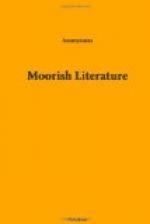“I was yet young when in the Orient we gave the wolves a bloody repast and a pasture to the birds. When our rude swords rang on the helmet, then they saw the sea rise and the vultures wade in blood."[2]
[2] Marmier, Lettres sur l’Islemde.
Robbery and pillage under armed bands, the ambuscade even, are celebrated among the Touaregs with as great pleasure as a brilliant engagement:
“Matella! May thy father die!
Thou art possessed by a demon,
To believe that the Touaregs are not men.
They know how to ride the camel; they
Ride in the morning and they ride at night;
They can travel; they can gallop:
They know how to offer drink to those
Who remain upon their beasts.
They know how to surprise a
Courageous man in the night.
Happy he sleeps, fearless with kneeling
camels;
They pierce him with a lance,
Sharp and slender as a thorn,
And leave him to groan until
His soul leaves his body:
The eagle waits to devour his entrails."[3]
[3] Hanoteau, Essaie de grammaire de la langue Tamachek, pp. 210, 211. Paris, 1860.
They also show great scorn for those who lead a life relatively less barbarous, and who adorn themselves as much as the Touaregs can by means of science and commerce:
“The Tsaggmaren are not men,
Not lance of iron, nor yet of wood,
They are not in harness, not in saddles,
They have no handsome saddle-bags,
They’ve naught of what makes mankind
proud;
They’ve no fat and healthy camels,
The Tsaggmaren; don’t speak of them;
They are people of a mixed race,
There is no condition not found with them.
Some are poor, yet not in need;
Others are abused by the demon,
Others own nothing but their clubs.
There are those who make the pilgrimage,
and repeat it,
There are those who can read the Koran
and learn by that
They possess in the pasturage camels,
and their little ones,
Besides nuggets of gold all safely wrapped."[4]
[4] Hanoteau, p. 213.
Another style, no less sought for among the Berbers inhabiting cities, is the “complaint” which flourished in lower Morocco, where it is known under the Arab name of Lqist (history). When the subject is religious, they call it Nadith (tradition). One of the most celebrated is that wherein they tell of the descent into the infernal regions of a young man in search of his father and mother. It will give an idea of this style of composition to recite the beginning:
“In the name of God, most clement
and merciful,
Also benediction and homage to the prophet
Mohammed,
In the name of God, listen to the words
of the author,
This is what the Talebs tell, according
to the august Koran.
Let us begin this beautiful story by
Invoking the name of God.
Listen to this beautiful story, O good




